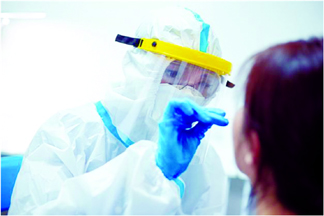
Scientists have found antibodies in the blood of certain Covid-19 donors that can block infection from a broad set of coronaviruses, specifically in people who have recovered from the SARS-CoV-2 virus and were then vaccinated.
The researchers from Scripps Research and the University of North Carolina (UNC), US, found this includes not only the Covid -19-causing SARS-CoV-2, but also SARS-CoV-1 and MERS-CoV.
The study, published in the journal Immunity, could lead to the development of a broad coronavirus vaccine and related antibody therapeutics. Both could be used against future coronavirus pandemics as well as any future variants of SARS-CoV-2.
“We show here that there are individual human monoclonal antibodies that can be found that protect against all three recent deadly coronaviruses: SARS-CoV-1, SARS-CoV-2 and MERS-CoV,” said study co-senior author Raiees Andrabi, institute investigator at Scripps Research.
SARS-CoV-2, along with SARS-CoV-1 — the cause of the 2002-04 SARS outbreak — and MERS-CoV, the cause of deadly Middle East Respiratory Syndrome, belong to a broad grouping of coronaviruses known as betacoronaviruses.
These viruses mutate at a modestly high rate, creating a significant challenge for the development of vaccines and antibody therapies against them.
In the case of SARS-CoV-2, although existing vaccines have been very helpful in limiting the toll of disease and death from the pandemic, new SARS-CoV-2 variants have emerged that can spread even among vaccine recipients.
However, over the past two years, the team has been finding evidence that SARS-CoV-2 and other betacoronaviruses have a vulnerable site that does not mutate much. This site, which is in the S2 region (or base) of the viral spike protein, is relatively conserved on betacoronaviruses that infect a variety of animal species.
By contrast, current SARS-CoV-2 vaccines mainly target the viral spike protein’s relatively mutable S1 region, with which the virus binds to host-cell receptors.
The S2 site plays a key role in how betacoronaviruses progress from receptor-binding to the membrane fusion that enables entry into host cells in the respiratory tract.





Be the first to comment